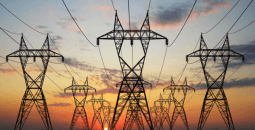

South Africa’s economy expanded in the second quarter as the electricity supply improved and consumers dipped into their wallets, but the result wasn’t seen dislodging the case for an interest-rate cut later this month.
Gross domestic product rose 0.4% in the three months through June, Statistics South Africa said in a report released in the capital, Pretoria, on Tuesday. That compared with no growth in the prior quarter, which was revised from a previously reported contraction of 0.1%
All but one of 17 economists in a Bloomberg survey expected an expansion. The median estimate was for a 0.5% rise.
Weaker-than-expected growth “coming alongside the easing of inflation pressures, further strengthens the case for an interest rate cut,” Jason Tuvey, deputy chief emerging markets economist at Capital Economics, wrote in a note to clients.
The rand eased against the dollar following the publication of the data, softening to 17.97 per dollar at 1:49 p.m. in Johannesburg from around 17.89 before the release.
The South African Reserve Bank is widely expected to lower its benchmark rate by 25 basis points when it delivers its next policy decision on September 19, after inflation softened more than expected to 4.6% in July – close to the the midpoint of its 3% to 6% target range.
Electricity supply
Still, the economy’s performance was clearly an improvement over the opening three months of the year. That coincided with a reprieve from rolling electricity outages known locally as load shedding that have been instituted for up to 10 hours daily for years on end. There was no load shedding in the second quarter.
Eskom, the state utility that provides the bulk of the nation’s power, has attributed the improved supply to new generation units coming on line, a decline in unplanned outages and an improved maintenance program, and has said blackouts aren’t likely to be reimposed over the upcoming summer.
The turnaround comes as the government makes a sustained effort to improve performance on several fronts after years of falling short.
“Growth, especially over the medium-term, is still hinged on the reform agenda taking shape, so we expect that to continue and to drive investments in the economy,” said Koketso Mano, senior economist at FNB. “We’ve already started to see improved confidence, so that should filter through to investments and hopefully potential growth continues.”
Finance, real estate and business services grew 1.3% in the second quarter, contributing 0.3 percentage points to the GDP growth. Manufacturing and the electricity sectors both turned positive, growing 1.1% and 3.1% respectively.
The latter was the largest increase in electricity output, excluding the volatile period of the Covid-19 pandemic, since the third quarter of 2008.
Household consumption also advanced despite political uncertainty around the nation’s May 29 election, rising 1.4% in the second quarter after declining 0.2% in the prior three months.
Business and consumer confidence has improved somewhat since the vote, in which the African National Congress lost its parliamentary majority for the first time since 1994. It then formed a broad governing coalition with nine rival parties, including the centrist Democratic Alliance.
“Consumption’s strong comeback in South Africa, which helped the economy expand in the second quarter of the year, will likely be sustained in the coming quarters,” said Yvonne Mhango, Africa economist at Bloomberg Economics. “As inflation slows and rate cuts commence, that should continue to spur demand.”